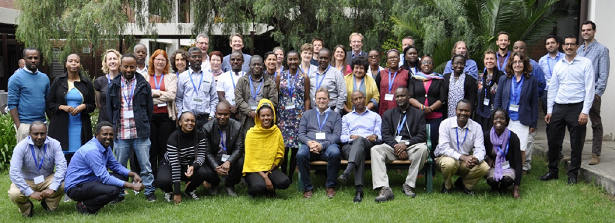Scaling up climate-smart agriculture: GCP-4 midterm workshop

In June 2019, the projects from the fourth call of the Food & Business Global Challenges Programme gathered for joint learning and exchanges. The participants reflected on progress and research findings, including bottlenecks and challenges in their projects. In depth discussions took place on the concept and application of scaling. Additionally, a Public Dialogue on “Scaling Climate-Smart Agriculture in East Africa” was organized at the International Livestock Research Institute in Addis Ababa, Ethiopia.
In recent years, there is growing consensus that climate change calls for agricultural transformation, and that scaling climate-smart agriculture (CSA) is an important element of this process. The fourth call for proposals of the Global Challenges Programme focuses on scaling climate smart agriculture.
From June 12 till 14, 2019, the projects funded in the GCP-4 call came together for their joint mid-term workshop. The workshop brought together 55 participants drawn from the eight GCP-4 project teams, CCAFS, NWO-WOTRO Science for Global Development and the Food & Business Knowledge Platform (F&BKP). The public dialogue held on the afternoon of June 13 was attended by an additional 34 participants representing the private sector, research, non-governmental organisations, government and international development partners in Ethiopia. Finally, some of the participants visited the Iteya Agricultural Office and Kulumsa Agricultural Research Center on June 15 to learn about extension services, research and practice from rural agricultural centers in Ethiopia.
Forthcoming strategies and perspectives
The projects presented their progress to each other and discussed their strategies for the remaining project execution time, also with a focus on an enhanced understanding of progress and performance with regards to objectives at project and programme level of the respective projects. Common coordination points among all projects included:
- A need to learn more about financial inclusion and business models.
- A topical interest in climate-smart dairy.
- The need for increased communication among projects and with key stakeholders.
- Incorporating participatory research methods that can be integrated into project models.
- Keeping a programmatic view of climate change for more international agenda-setting.
Scaling opportunities
Furthermore the concept of scaling was discussed in detail, during the internal meeting as well as the public session. A number of central issues were addressed that are relevant for the process of understanding and implementing scaling. This includes incorporating diverse actors, such as smart engineers, web weavers, system builders, and institutional workers; finding relevance between scaling and business realities; aligning CSA with country priorities; exploring opportunities for sharing and prototyping; identifying a process of prioritization; creating space for feedback at multiple levels; delivering research that deliberately inserts local priorities into national contexts; promoting inclusivity and evaluating which voices are present in the design of CSA scaling processes.
_ _ _
Source: NWO-WOTRO





